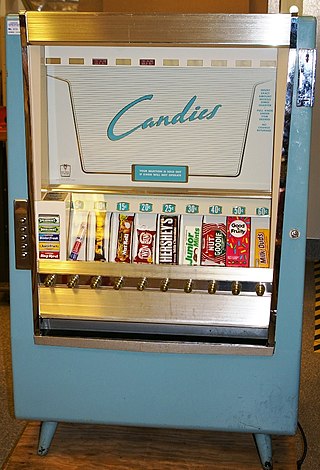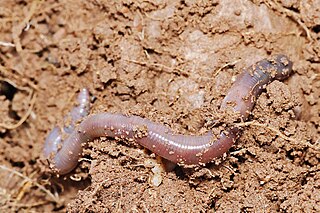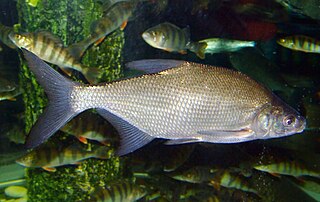Gallery
- Display of products in the machine
- A worm machine in the port of Roquetas de Mar, Spain
- Live bait vending machine, Brighton Recreation Area, Michigan
A bait machine is a vending machine that dispenses live bait, such as worms and crickets, for fishing. [1] In the case of worms, it may be called a worm machine.
Red or manure worms are kept in stock within a growing medium, and oftentimes the machines have a small reservoir in them to simulate rain and to feed the worms a nutrient solution. Electrical pulses are used to encourage the worms to come closer to the surface to obtain the nutrient solution. In connection with heating and constant high humidity, worms attain higher reproduction rates and faster growth.[ citation needed ]

Trout is a generic common name for numerous species of carnivorous freshwater ray-finned fishes belonging to the genera Oncorhynchus, Salmo and Salvelinus, all of which are members of the subfamily Salmoninae in the family Salmonidae. The word trout is also used for some similar-shaped but non-salmonid fish, such as the spotted seatrout/speckled trout.
Bass is a generic common name shared by many species of ray-finned fish from the large clade Percomorpha, mainly belonging to the orders Perciformes and Moroniformes, encompassing both freshwater and marine species. The word bass comes from Middle English bars, meaning "perch", despite that none of the commonly referred bass species belong to the perch family Percidae.

Vermicompost (vermi-compost) is the product of the decomposition process using various species of worms, usually red wigglers, white worms, and other earthworms, to create a mixture of decomposing vegetable or food waste, bedding materials, and vermicast. This process is called vermicomposting, with the rearing of worms for this purpose is called vermiculture.

A vending machine is an automated machine that dispenses items such as snacks, beverages, cigarettes, and lottery tickets to consumers after cash, a credit card, or other forms of payment are inserted into the machine or payment is otherwise made. The first modern vending machines were developed in England in the early 1880s and dispensed postcards. Vending machines exist in many countries and, in more recent times, specialized vending machines that provide less common products compared to traditional vending machine items have been created.

Detritivores are heterotrophs that obtain nutrients by consuming detritus. There are many kinds of invertebrates, vertebrates, and plants that carry out coprophagy. By doing so, all these detritivores contribute to decomposition and the nutrient cycles. Detritivores should be distinguished from other decomposers, such as many species of bacteria, fungi and protists, which are unable to ingest discrete lumps of matter. Instead, these other decomposers live by absorbing and metabolizing on a molecular scale. The terms detritivore and decomposer are often used interchangeably, but they describe different organisms. Detritivores are usually arthropods and help in the process of remineralization. Detritivores perform the first stage of remineralization, by fragmenting the dead plant matter, allowing decomposers to perform the second stage of remineralization.

A fishing lure is any one of a broad category of artificial angling baits that are inedible replicas designed to mimic prey animals that attract the attention of predatory fish, typically via appearances, flashy colors, bright reflections, movements, vibrations and/or loud noises which appeal to the fish's predation instinct and entice it into gulping the lure. Angling activities using lures are known as lure fishing.

Waxworms are the caterpillar larvae of wax moths, which belong to the family Pyralidae. Two closely related species are commercially bred – the lesser wax moth and the greater wax moth. They belong to the tribe Galleriini in the snout moth subfamily Galleriinae. Another species whose larvae share that name is the Indianmeal moth, though this species is not available commercially.

Boilies are a type of artificial fishing bait made from boiled paste that usually consists of fishmeals, milk proteins, bird foods, semolina and soya flour, which are mixed with egg white as a binding agent. The mixture is then boiled to form hard, round balls that diffuse evenly and slowly in water, and additional flavourings and aromatic attractants are usually included in the mixture to enhance the olfactory appeal to the fish. The spherical shape also allows the baits to be catapulted accurately when fishing at distant waters.

The common bream, also known as the freshwater bream, bream, bronze bream, carp bream or sweaty bream, is a European species of freshwater fish in the family Cyprinidae. It is now considered to be the only species in the genus Abramis.

Live food is living animals used as food for other carnivorous or omnivorous animals kept in captivity; in other words, small preys fed alive to larger predators kept either in a zoo or as a pet.

Fishing tackle is the equipment used by anglers when fishing. Almost any equipment or gear used in fishing can be called fishing tackle, examples being hooks, lines, baits/lures, rods, reels, floats, sinkers/feeders, nets, spears, gaffs and traps, as well as wires, snaps, beads, spoons, blades, spinners, clevises and tools that make it easy to tie knots.

A plastic worm or trout worm is a soft-bodied fishing lure made of elastomer polymer material, generally simulating an earthworm. Plastic worms are typically impaled onto a hook, and can carry a variety of shapes, colors and sizes, awith some are even scented to simulate live bait.

Soft plastic bait, commonly known as soft lure, soft plastics, plastic bait, worm lure or just worm, is any of a range of elastomer-based fishing lures termed so because of their flexible, flesh-like texture. Soft lures are available in a large range of colours, sizes and particularly shapes, and are typically impaled directly onto a fishing hook like an ordinary bait.

Worm charming, worm grunting, and worm fiddling are methods of attracting earthworms from the ground. The activity is usually performed to collect bait for fishing but can also take the form of a competitive sport in areas such as the UK and East Texas. As a skill and profession worm charming is now very rare, with the art being passed through generations to ensure that it survives.

Fishing bait is any luring substance used specifically to attract and catch fish, typically when angling with a hook and line. There are generally two types of baits used in angling: hookbaits, which are directly mounted onto fish hooks and are what the term "fishing bait" typically refers to; and groundbaits, which are scattered separately into the water as an "appetizer" to attract the fish nearer to the hook. Despite the bait's sole importance is to provoke a feeding response out of the target fish, the way how fish react to different baits is quite poorly understood.

Invasive species of earthworms from the suborder Lumbricina have been expanding their range in North America. Earthworms are considered one of the most abundant macroinvertebrates in the soil of ecosystems in temperate and tropical climates. There are around 3,000 species known worldwide. They are considered keystone species in their native habitats of Asia and Europe because, as detritivores, they alter many different variables of their ecosystem. Their introduction to North America has had marked effects on the nutrient cycles and soil profiles in temperate forests. These earthworms increase the cycling and leaching of nutrients by breaking up decaying organic matter and spreading it into the soil. This thins out the soil rapidly because earthworms do not require a mate to reproduce, allowing them to spread fast. Since plants native to these northern forests are evolutionarily adapted to the presence of thick layers of decaying organic matter, the introduction of worms can lead to a loss of biodiversity as young plants face less nutrient-rich conditions. Some species of trees and other plants may be incapable of surviving such changes in available nutrients. This change in the plant diversity in turn affects other organisms and often leads to increased invasions of other exotic species as well as overall forest decline. They are considered one of the most invasive animals in the Midwestern United States along with feral swine.
Earthworms are invasive species throughout the world. Of a total of about 6,000 species of earthworm, about 120 species are widely distributed around the globe. These are the peregrine or cosmopolitan earthworms. Some of these are invasive species in many regions.

Tevnia is a genus of giant tube worm in the family Siboglinidae, with only one species, Tevnia jerichonana, living in a unique deep-sea environment. These deep sea marine species survive in environments like hydrothermal vents. These vents give off gas and toxic chemicals with the addition of having superheated temperatures. The giant tube worm prefers environments such as these despite the harsh temperature and toxic sea water.
Vermiponics is a soil-less growing technique that combines hydroponics with vermiculture by utilizing diluted wormbin leachate as the nutrient solution as opposed to the use of fish waste or the addition of manufactured chemicals to provide the nutrients.

Ferric EDTA is the coordination complex formed from ferric ions and EDTA. EDTA has a high affinity for ferric ions. It gives yellowish aqueous solutions.